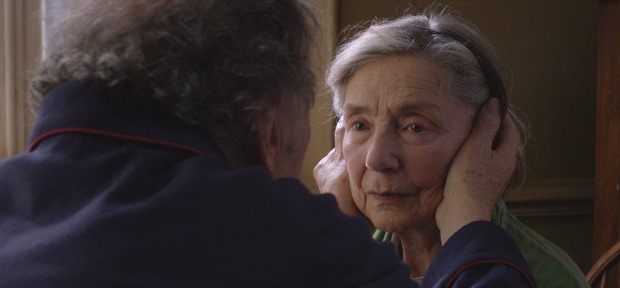Amour
You will remember the film, and you will remember the emotions, and there will be no humiliation in the crying.
Plot summary
George and Anne are in their eighties. They are cultivated, retired music teachers. Their daughter, who is also a musician, lives abroad with her family. One day, Anne has an attack. The couple's bond of love is severely tested.

With the inevitability of, well, death, Amour (winner of this year’s Palme D’Or at Cannes) lumbers forward, relentless, as determined as gravity. Georges (Jean- Louis Trintignant) and Anne (Emmanuelle Riva) are a couple in their 80s, music teachers and music lovers, living out a quiet complacent retirement. They go to the theatre, they eat breakfast, they use the loo; just two people getting old, one getting older much more rapidly. When Anne suffers a stroke at breakfast one morning, it’s not nice, but it’s not exceptional, or even surprising; it’s recognizably, universally, devastating in its ordinariness.
In Michael Haneke’s new film, there is no wide scope of big troubling ideas (as there was in The White Ribbon, The Piano Teacher, or Time of the Wolf), no audacious toying with our cinematic expectations or spectator responsibilities (Funny Games, Hidden), instead he uses a macro lens, dispassionate and unflinching. The trick this time is simplicity, ruthless simplicity. There is no mystery (we see the corpse in the opening scene), there is no suspense (the narrative arc is more like a graph of Lehman Brothers’ stock prices after the financial implosion of 2008), it’s just the bald indignity of old age and decline. And this is what makes Amour virtuosic and barely bearable—no other director has dared take on aging so candidly, so unsentimentally: there is no escape, there can be no happy ending, just raw honesty; a whimper not a bang. Unlike most films that find room for octogenarians (from the wonderful Ruth Gordon in the wonderful Harold and Maud to the fantasy laudanum of the Cocoons), Amour has no cuddlesome old people spouting folksy wisdom, no reawakening of inner children—this is a film of incontinence, of senescent temper tantrums, of quiet despair, of ordinary seismic loss. Of love.
A mark of the shattering poignancy is a subtle scene where their daughter Eva (Isabelle Huppert) comes to visit Anne after a further stroke. Dutiful, cheery, she chatters with the heedlessness of those whose days are not finite, talking of mundane nuisances and triumphs, about stock investments, the kids, and petty annoyances—news from a world that is still invested in a future. It’s heartbreaking, especially since it’s crushingly familiar.
Amour is a brave and brutal film, a masterwork of form and performance. Haneke’s frame and composition are exquisite: an emptiness of grays and greens; the immobile frame in long shot, locking the characters in a prison of time of fate; the long takes (it is not a film that’s in a hurry) and a camera that won’t look away, capturing the indignity, the ennui, the silence and waiting. And there has seldom been a performance by an actress as courageous and uncompromised and completely lacking in vanity as Riva’s is here. The only one close is Ellen Burstyn’s in Requiem For a Dream. The vulnerability, the stark intimacy, is breathtaking. And Trintignant is quietly superb, creating a profound chemistry that is tender and excrutiating.
At one point Georges recalls crying at a film he saw as a child, ‘I don’t remember the film only the emotions, the humiliation of crying.’ With Amour, you will remember the film, and you will remember the emotions, and there will be no humiliation in the crying.










COMMENTS